
Journalist Nic Paton takes a closer look at NAHT’s International Committee and finds out what we can learn from education across the world.
As members will undoubtedly be well aware, NAHT’s primary focus as a trade union is supporting school leaders across England, Wales and Northern Ireland.
But if the past few years of Brexit, the covid-19 pandemic and accelerating climate change have shown us anything, it is that even if the United Kingdom is geographically an island, in terms of education, learning, leadership and knowledge transfer, we are – and in fact need to be – anything but.
This is where the work of NAHT’s International Committee comes into play. Just as NAHT has had four priority ‘pillars’ of domestic activity (pay and funding, workload and well-being, recruitment and retention, and inspection), it has four priority international pillars, as committee chair Dave Woods explains.

DAVE WOODS,
NAHT COMMITTEE CHAIR
“NAHT has had an International Committee for a long time,” he tells Leadership Focus.
“I became the chair in mid-2021, during the pandemic's peak. That experience, while intensely challenging for all school leaders, illustrated very clearly the opportunity and benefits of school leaders in the UK, more widely across Europe and in different parts of the world, sharing what was going on in their schools.
“Against the backdrop of buildings being closed and countries going into lockdowns, being able to have online discussions around how things were working in different countries was invaluable.
“For example, we often thought we were in a terrible situation in the way the pandemic was playing out and being managed here, but actually, what it showed was that in a lot of cases we were doing much better than other countries we perceived as doing better than us,” adds Dave, who is also NAHT Ealing branch secretary, London regional president and head teacher of Beaconsfield Primary School in Southall.
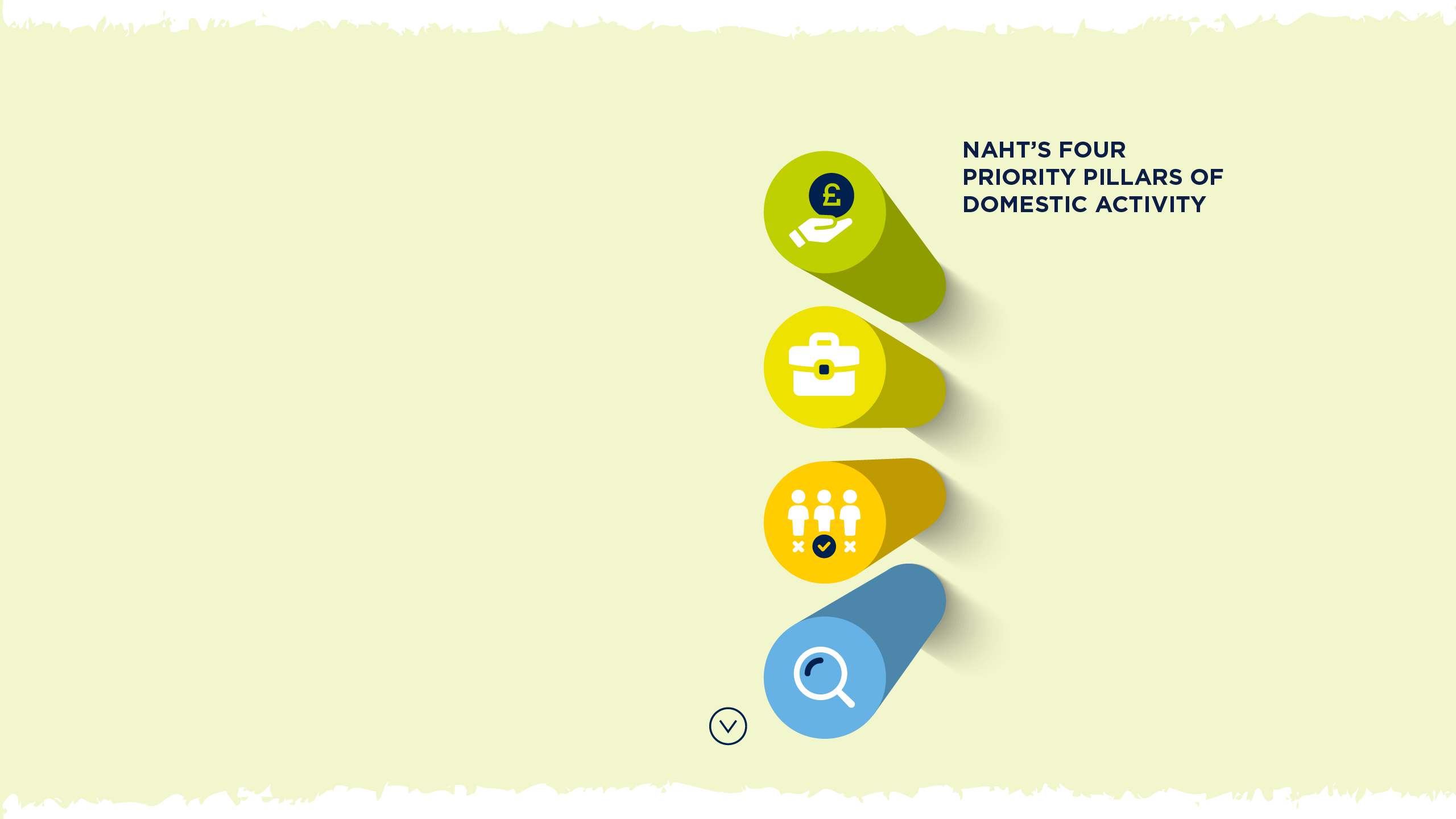

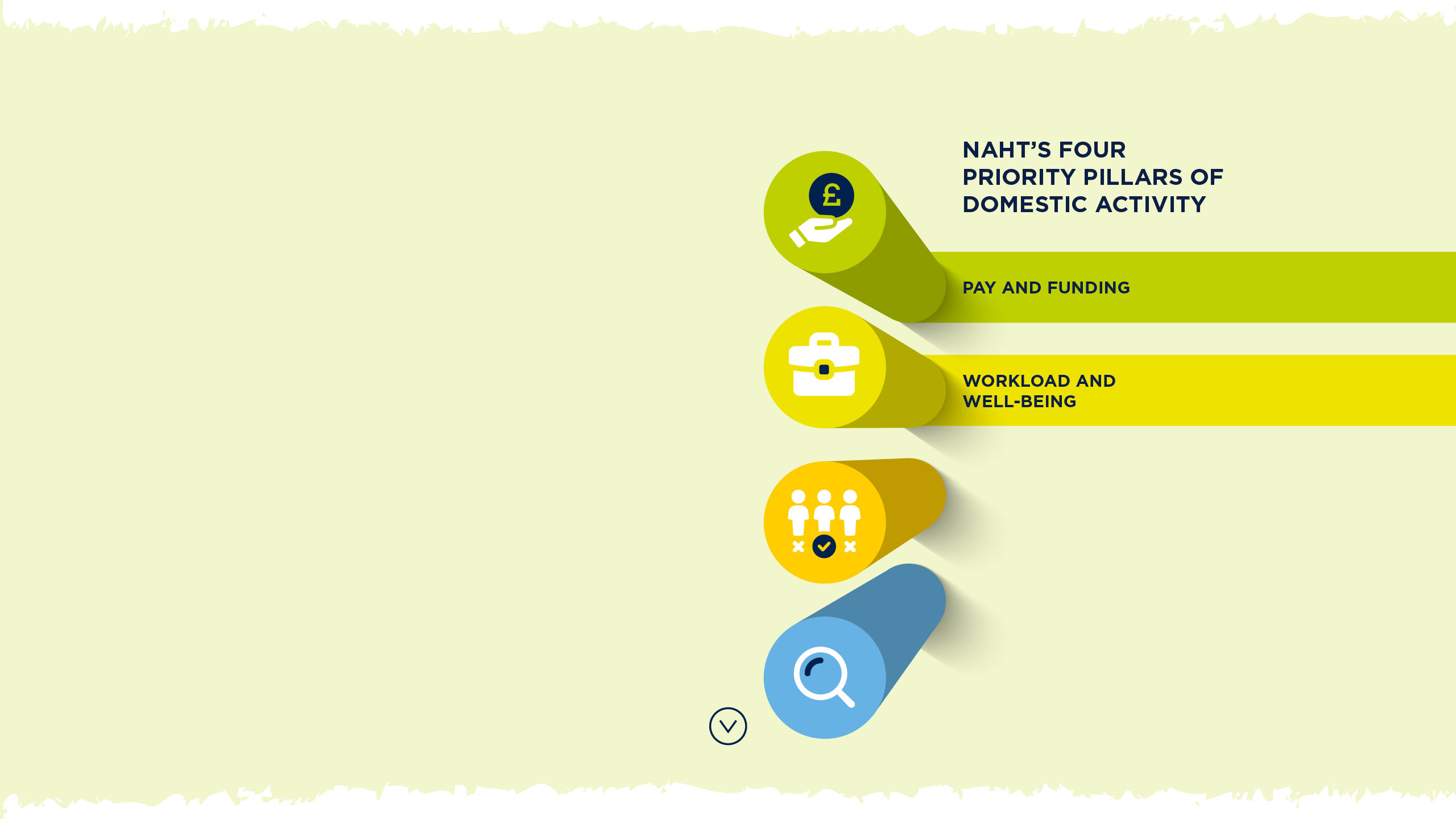
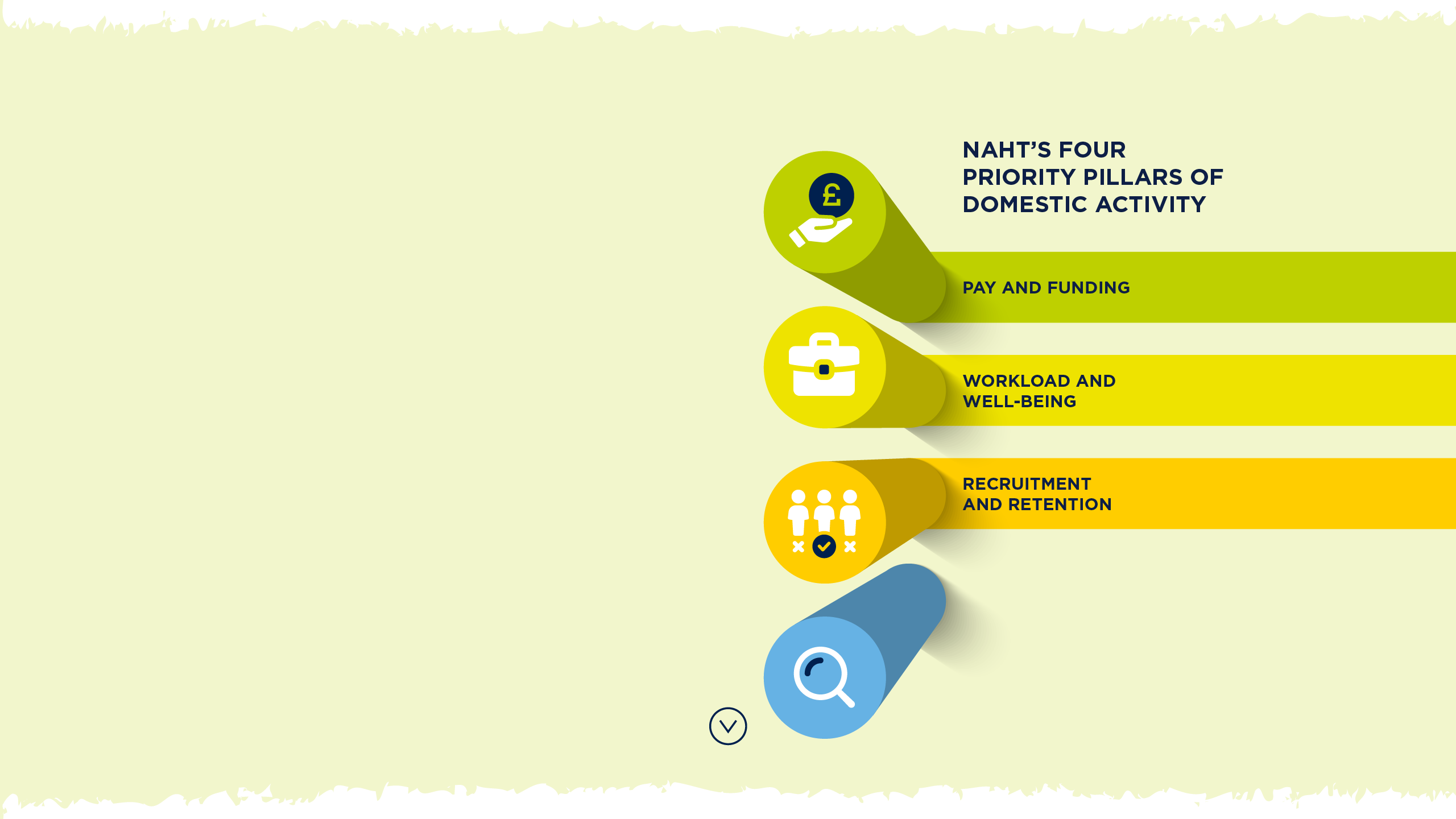
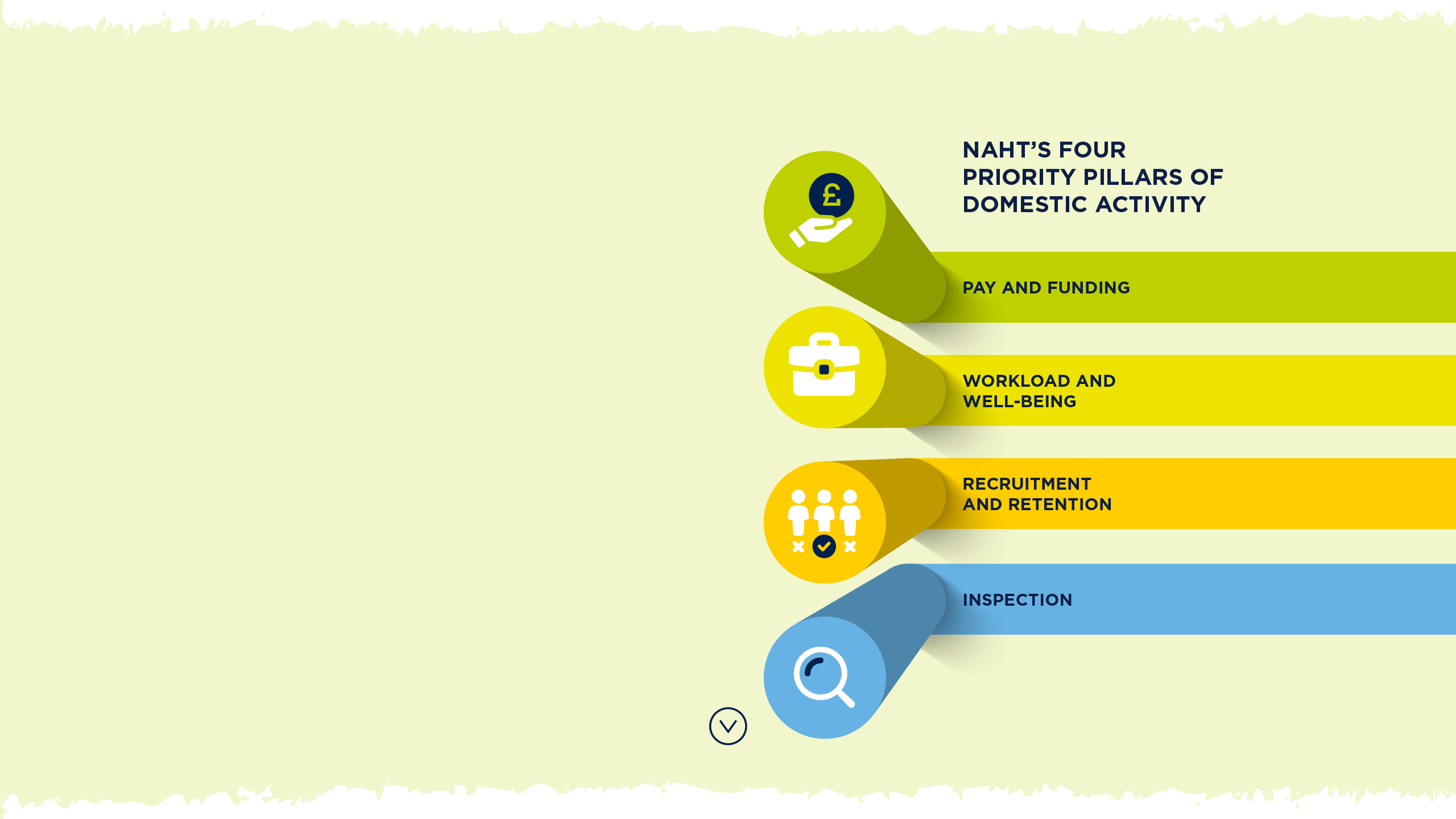
As members will undoubtedly be well aware, NAHT’s primary focus as a trade union is supporting school leaders across England, Wales and Northern Ireland.
But if the past few years of Brexit, the covid-19 pandemic and accelerating climate change have shown us anything, it is that even if the United Kingdom is geographically an island, in terms of education, learning, leadership and knowledge transfer, we are – and in fact need to be – anything but.
This is where the work of NAHT’s International Committee comes into play. Just as NAHT has had four priority ‘pillars’ of domestic activity (pay and funding, workload and well-being, recruitment and retention, and inspection), it has four priority international pillars, as committee chair Dave Woods explains.
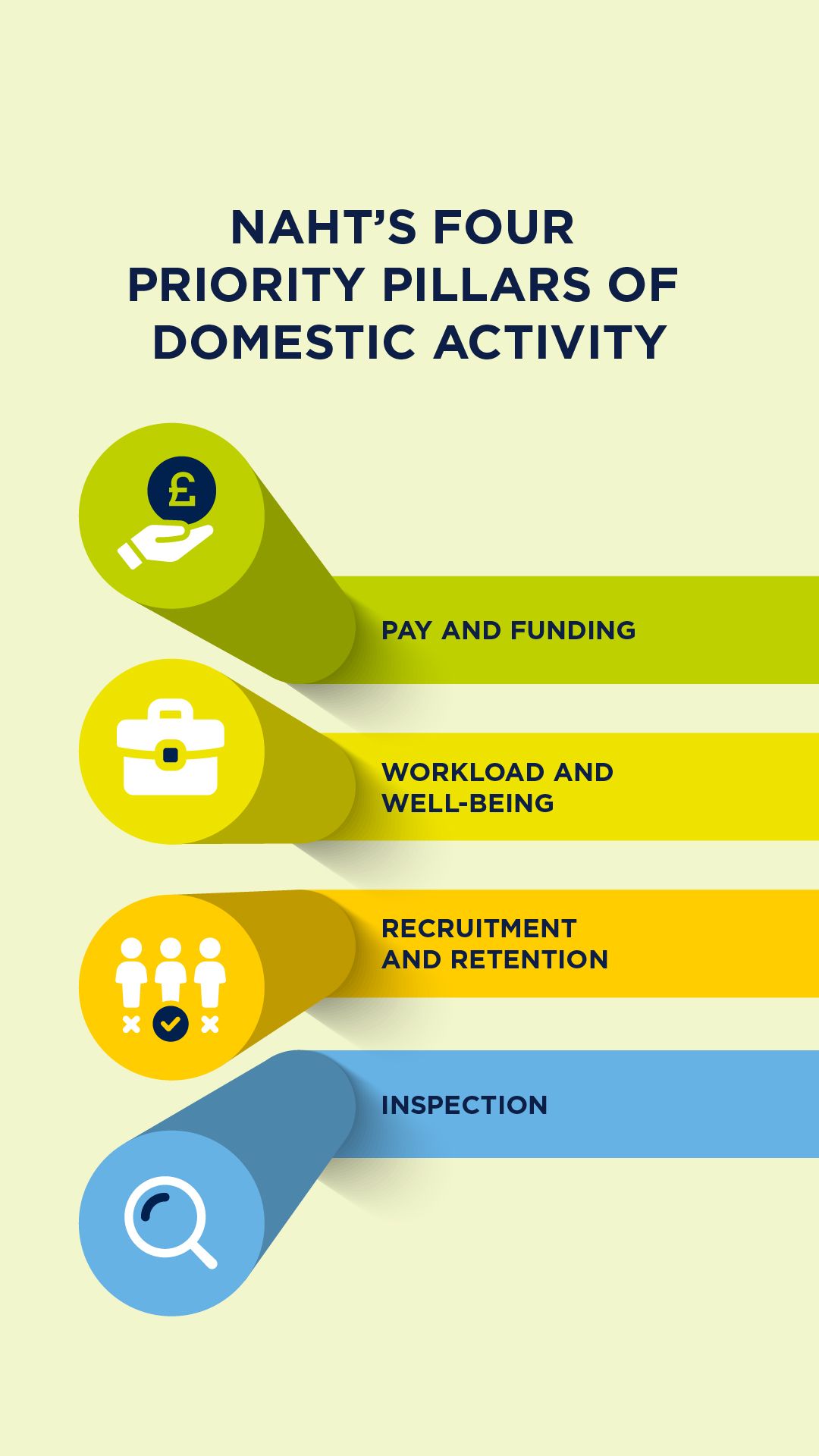

DAVE WOODS,
NAHT COMMITTEE CHAIR
“NAHT has had an International Committee for a long time,” he tells Leadership Focus.
“I became the chair in mid-2021, during the pandemic's peak. That experience, while intensely challenging for all school leaders, illustrated very clearly the opportunity and benefits of school leaders in the UK, more widely across Europe and in different parts of the world, sharing what was going on in their schools.
“Against the backdrop of buildings being closed and countries going into lockdowns, being able to have online discussions around how things were working in different countries was invaluable.
“For example, we often thought we were in a terrible situation in the way the pandemic was playing out and being managed here, but actually, what it showed was that in a lot of cases we were doing much better than other countries we perceived as doing better than us,” adds Dave, who is also NAHT Ealing branch secretary, London regional president and head teacher of Beaconsfield Primary School in Southall.
“The current government and the governments before it signed the UK up to various legal obligations through the International Labour Organization (ILO), various United Nations (UN) charters and the European Convention on Human Rights,” Dave says.
“But what we’ve seen in the last 12 months is the government passing legislation, like the Strikes (Minimum Service Levels) Act, that directly contradicts these obligations. We have, therefore, been working with the Trades Union Congress (TUC) on submissions to go to the ILO and the UN to challenge the validity of this Act directly,” Dave explains, with the government in October also signalling its intent to introduce minimum service levels in schools and colleges.
“The legislation has a direct and detrimental impact on NAHT members’ rights as trade unionists, especially head teachers because they are probably going to be disproportionately targeted as the people required to work, which removes their trade unionist right to take industrial action,” Dave says.

HELENA MACORMAC,
NAHT INTERNATIONAL COMMITTEE POLICY LEAD
“Internationally, the committee is working to highlight how the Act is a direct breach of the Universal Declaration of Human Rights and ILO conventions,” emphasises International Committee policy lead Helena Macormac.

“The current government and the governments before it signed the UK up to various legal obligations through the International Labour Organization (ILO), various United Nations (UN) charters and the European Convention on Human Rights,” Dave says.
“But what we’ve seen in the last 12 months is the government passing legislation, like the Strikes (Minimum Service Levels) Act, that directly contradicts these obligations. We have, therefore, been working with the Trades Union Congress (TUC) on submissions to go to the ILO and the UN to challenge the validity of this Act directly,” Dave explains, with the government in October also signalling its intent to introduce minimum service levels in schools and colleges.
“The legislation has a direct and detrimental impact on NAHT members’ rights as trade unionists, especially head teachers because they are probably going to be disproportionately targeted as the people required to work, which removes their trade unionist right to take industrial action,” Dave says.

HELENA MACORMAC,
NAHT INTERNATIONAL COMMITTEE POLICY LEAD
“Internationally, the committee is working to highlight how the Act is a direct breach of the Universal Declaration of Human Rights and ILO conventions,” emphasises International Committee policy lead Helena Macormac.
The second pillar feeds closely into this work because it is about emphasising and promoting NAHT’s role as an international trade union, of being part of the worldwide trade union ‘family’.
“I’ve been joining international meetings and committees at the TUC and the Irish Congress of Trade Unions, where we’ve never sat before,” points out Helena.
“NAHT has received solidarity letters about the Strikes Act from education and leadership unions in other European countries, such as Spain, Italy and Germany,” agrees Dave. “It is about affirming our links with Scotland and the Republic of Ireland. And then more widely, too, into Europe.
“It is about promoting and supporting internationalism through our membership with ESHA, the European School Heads Association – and in fact, every NAHT member is by default also a member of ESHA, which is perhaps not that well known,” he adds.
This activity, in turn, has fed through to NAHT providing support, solidarity and engagement for a range of international charities, including Remembering Srebrenica, and – since Russia’s invasion of Ukraine – school heads and senior leaders there too.
“Remembering Srebrenica seeks to educate against the horrors of genocide and ethnic cleansing,” says Dave. “So, we have been engaged in getting the charity’s work spread more widely among our members. Sadly, we’re seeing tensions rise in the Balkans again, and similar horrors are playing out in Ukraine.
“Through our international work we have, again, sponsored some education colleagues from Ukraine so that later this term they can travel out of the country and attend an education event. It is about ensuring they can continue their wider professional development while trying to deliver education in an active warzone,” he adds.
“It is also about increasing our activism in broader campaigns,” says Helena. “So, supporting school leaders in countries that have experienced recent natural disasters, the likes of Libya and Morocco. Part of the committee’s role is to signpost members to international campaigns if they want to get involved,” she adds.




The second pillar feeds closely into this work because it is about emphasising and promoting NAHT’s role as an international trade union, of being part of the worldwide trade union ‘family’.
“I’ve been joining international meetings and committees at the TUC and the Irish Congress of Trade Unions, where we’ve never sat before,” points out Helena.
“NAHT has received solidarity letters about the Strikes Act from education and leadership unions in other European countries, such as Spain, Italy and Germany,” agrees Dave. “It is about affirming our links with Scotland and the Republic of Ireland. And then more widely, too, into Europe.

“It is about promoting and supporting internationalism through our membership with ESHA, the European School Heads Association – and in fact, every NAHT member is by default also a member of ESHA, which is perhaps not that well known,” he adds.
This activity, in turn, has fed through to NAHT providing support, solidarity and engagement for a range of international charities, including Remembering Srebrenica, and – since Russia’s invasion of Ukraine – school heads and senior leaders there too.
“Remembering Srebrenica seeks to educate against the horrors of genocide and ethnic cleansing,” says Dave. “So, we have been engaged in getting the charity’s work spread more widely among our members. Sadly, we’re seeing tensions rise in the Balkans again, and similar horrors are playing out in Ukraine.
“Through our international work we have, again, sponsored some education colleagues from Ukraine so that later this term they can travel out of the country and attend an education event. It is about ensuring they can continue their wider professional development while trying to deliver education in an active warzone,” he adds.
“It is also about increasing our activism in broader campaigns,” says Helena. “So, supporting school leaders in countries that have experienced recent natural disasters, the likes of Libya and Morocco. Part of the committee’s role is to signpost members to international campaigns if they want to get involved,” she adds.
The third pillar of activity is promoting international activism, especially around climate change and global heating. Dave explains: “As a committee and union, we accept that climate change is happening – that we’re already seeing the real consequences within education of extremes in climate and increasing natural disasters.
“Research by Education Cannot Wait, for example, has estimated that as many as 40 million children a year across the world are now having disrupted learning because of issues linked to natural disasters and extremes in climate.
“Here in the UK, too, we saw in summer 2022 real extremes in temperature. For us, it was just a bit uncomfortable. But some children have to deal with flash flooding or raging fires.
“Pupils want this topic addressed, and they want it taught, yet governments often refuse to do so. The UK government made a whole lot of commitments at the UN’s 2021 Climate Change Conference (COP26) when it took place in Glasgow, and almost none of them have come to fruition. And now, as we have seen in the past few weeks, there is even direct back-pedalling on existing net zero commitments,” says Dave.
“We’re hoping to make a submission to COP28, which is coming up in Dubai at the end of November, to show what was promised to pupils and what is being done. Many schools across the UK use the UNICEF Convention on the Rights of the Child. In there is the right to learning and the right to a safe space,” he adds.
“So, we’re particularly pushing for a wider discussion on climate education, resourcing to make schools greener, and the retrofitting of school buildings for, one, efficiency and comfort and, two, to reduce climate impact,” Dave emphasises. This links, he adds, to NAHT’s ongoing work around pushing for the reduction of carbon dioxide (CO2) emissions across the UK’s schools’ estate more generally, including improving insulation, expanding solar panel use and, indeed, tackling critical infrastructure issues such as asbestos and RAAC ‘crumbly concrete’ within schools.






The third pillar of activity is promoting international activism, especially around climate change and global heating.
Dave explains: “As a committee and union, we accept that climate change is happening – that we’re already seeing the real consequences within education of extremes in climate and increasing natural disasters.
“Research by Education Cannot Wait, for example, has estimated that as many as 40 million children a year across the world are now having disrupted learning because of issues linked to natural disasters and extremes in climate.
“Here in the UK, too, we saw in summer 2022 real extremes in temperature. For us, it was just a bit uncomfortable. But some children have to deal with flash flooding or raging fires.
“Pupils want this topic addressed, and they want it taught, yet governments often refuse to do so. The UK government made a whole lot of commitments at the UN’s 2021 Climate Change Conference (COP26) when it took place in Glasgow, and almost none of them have come to fruition. And now, as we have seen in the past few weeks, there is even direct back-pedalling on existing net zero commitments,” says Dave.
“We’re hoping to make a submission to COP28, which is coming up in Dubai at the end of November, to show what was promised to pupils and what is being done. Many schools across the UK use the UNICEF Convention on the Rights of the Child. In there is the right to learning and the right to a safe space,” he adds.

“So, we’re particularly pushing for a wider discussion on climate education, resourcing to make schools greener, and the retrofitting of school buildings for, one, efficiency and comfort and, two, to reduce climate impact,” Dave emphasises. This links, he adds, to NAHT’s ongoing work around pushing for the reduction of carbon dioxide (CO2) emissions across the UK’s schools’ estate more generally, including improving insulation, expanding solar panel use and, indeed, tackling critical infrastructure issues such as asbestos and RAAC ‘crumbly concrete’ within schools.
The fourth and final pillar is about learning exchange and sharing of pedagogy internationally, including navigating the profound consequences we have seen for education in this context from Brexit. “Previously, we could take part in the Erasmus scheme through the British Council,” Dave points out. “We have had it, of course, replaced by the Turing Scheme, which has much less money within it and predominantly focuses on higher education rather than secondary and primary schools.
“Brexit has meant that the international aspect of many schools – things like being involved in the International Schools Award, which the British Council ran also – has been diminished. The level of engagement in internationalism has dropped simply because it is now so much more difficult to travel with a range of students to other countries.
“From my school’s perspective, for example, many of my children don’t have UK passports; they don’t have European passports. France has brought in an individual scheme that enables us to travel there, but we can’t travel to Belgium without each child needing to get their own visa. This limits, for example, trips like visiting the First World War cemeteries,” Dave explains.

PAUL WHITEMAN,
NAHT GENERAL SECRETARY
“The International Committee’s work is about making sure our policy formulation is informed properly,” agrees NAHT general secretary Paul Whiteman. “It is about making sure those on our National Executive Committee can see what is going on internationally and learn from other educators. But, also, it is about us as a trade union.
“It is about mutual support. For me, it was actually a matter of some embarrassment that we had trade unions from Italy, Germany and Spain writing to us saying we could count on their support in the face of the anti-trade union legislation from the UK government because it shows just how far things have gone. But that’s what the international effort is really all about,” he adds.
Internationalism has always been part of the curriculum, concedes Dave Woods in conclusion. But, with everything else schools and school leaders need to focus on, it is all too easy for it to drop down the priority list. The International Committee, at its most basic, is to make sure this doesn’t happen, both within NAHT policy formulation and delivery and more widely within schools themselves.
“We want to highlight to schools and school leaders how – if they are willing to take up the opportunity – they can expand the horizons of their pupils and the opportunities for their pupils in this ever-shrinking world. We can explain how they can engage, take up opportunities presented, find relevant research and documents, connect with potential partners and so on,” says Dave.
“It is my personal and professional view that we are doing our pupils a disservice if we aren’t opening their eyes and giving them an opportunity to see and engage in a wider world. But it is also a way of reiterating to members that, as an NAHT member, you are part of a much wider international trade union and educational community,” he adds.






The fourth and final pillar is about learning exchange and sharing of pedagogy internationally, including navigating the profound consequences we have seen for education in this context from Brexit.
“Previously, we could take part in the Erasmus scheme through the British Council,” Dave points out. “We have had it, of course, replaced by the Turing Scheme, which has much less money within it and predominantly focuses on higher education rather than secondary and primary schools.
“Brexit has meant that the international aspect of many schools – things like being involved in the International Schools Award, which the British Council ran also – has been diminished. The level of engagement in internationalism has dropped simply because it is now so much more difficult to travel with a range of students to other countries.
“From my school’s perspective, for example, many of my children don’t have UK passports; they don’t have European passports. France has brought in an individual scheme that enables us to travel there, but we can’t travel to Belgium without each child needing to get their own visa. This limits, for example, trips like visiting the First World War cemeteries,” Dave explains.

PAUL WHITEMAN,
NAHT GENERAL SECRETARY
“The International Committee’s work is about making sure our policy formulation is informed properly,” agrees NAHT general secretary Paul Whiteman. “It is about making sure those on our National Executive Committee can see what is going on internationally and learn from other educators. But, also, it is about us as a trade union.
“It is about mutual support. For me, it was actually a matter of some embarrassment that we had trade unions from Italy, Germany and Spain writing to us saying we could count on their support in the face of the anti-trade union legislation from the UK government because it shows just how far things have gone. But that’s what the international effort is really all about,” he adds.
Internationalism has always been part of the curriculum, concedes Dave Woods in conclusion. But, with everything else schools and school leaders need to focus on, it is all too easy for it to drop down the priority list. The International Committee, at its most basic, is to make sure this doesn’t happen, both within NAHT policy formulation and delivery and more widely within schools themselves.
“We want to highlight to schools and school leaders how – if they are willing to take up the opportunity – they can expand the horizons of their pupils and the opportunities for their pupils in this ever-shrinking world. We can explain how they can engage, take up opportunities presented, find relevant research and documents, connect with potential partners and so on,” says Dave.
“It is my personal and professional view that we are doing our pupils a disservice if we aren’t opening their eyes and giving them an opportunity to see and engage in a wider world. But it is also a way of reiterating to members that, as an NAHT member, you are part of a much wider international trade union and educational community,” he adds.

NAHT'S INTERNATIONAL COMMITTEE
NAHT’s International Committee is chaired by Dave Woods, with Simon Kidwell as vice-chair. The other committee members are Andy Mellor, Angi Gibson, Judy Shaw, Paul Gosling, Jonny Gray, Julie Kelly, Maxine Stafford, Chris Hill (also current ESHA president) and Steve Baker.
Key partners and collaborators include the British Council, the ESHA, UNICEF, Voluntary Services Overseas, Leading Educators Around the Planet, Svitlo School, Spain’s Visiting Teachers Programme, Send My Friend to School and The Turing Scheme (the post-Brexit UK replacement for the EU's Erasmus programme).
The committee is closely involved in supporting the charity Remembering Srebrenica and in supporting Ukrainian school head colleagues. NAHT is part of the ESHA's General Assembly Committee, and committee members also attended the recent ESHA's biennial conference in Dubrovnik in October.
Finally, the committee plans to hold an online event during the winter to look at how NAHT can support refugee pupils accessing their right to an education.
To find out more about the committee and its work or to get involved, go to: www.naht.org.uk/About-Us/Our-international-work



